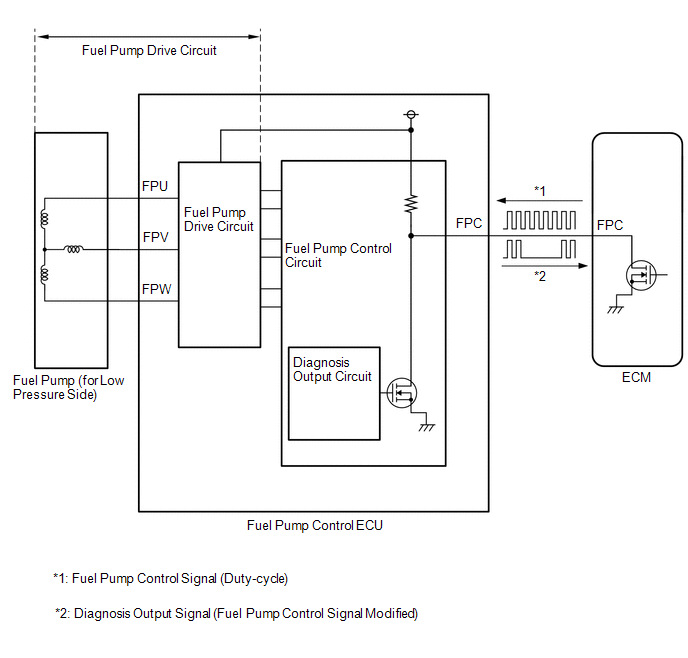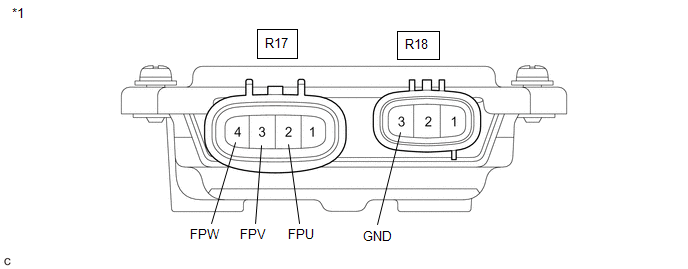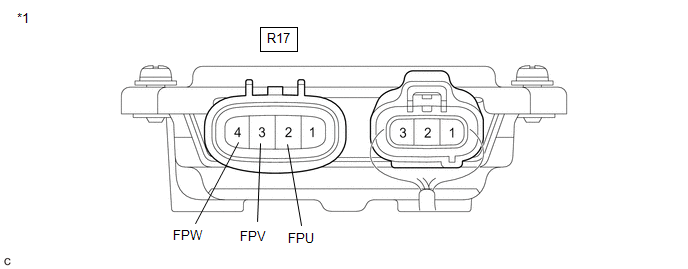- DTC judgment completed
- System normal
| Last Modified: 02-14-2025 | 6.11:8.1.0 | Doc ID: RM10000000150UE |
| Model Year Start: 2018 | Model: Camry HV | Prod Date Range: [07/2017 - 09/2018] |
| Title: A25A-FXS (ENGINE CONTROL): SFI SYSTEM: P12D41D; Fuel Pump Control Circuit Current Out of Range; 2018 MY Camry HV [07/2017 - 09/2018] | ||
|
DTC |
P12D41D |
Fuel Pump Control Circuit Current Out of Range |
DESCRIPTION
Refer to DTC P062712.
|
DTC No. |
Detection Item |
DTC Detection Condition |
Trouble Area |
MIL |
Memory |
Note |
|---|---|---|---|---|---|---|
|
P12D41D |
Fuel Pump Control Circuit Current Out of Range |
When the fuel pump control ECU operation duty ratio is 3 to 65%, overcurrent in the fuel pump circuit is detected for 3 seconds or more (2 trip detection logic). |
|
Comes on |
DTC stored |
SAE Code: P12D4 |
Related Data List
|
DTC No. |
Data List |
|---|---|
|
P12D41D |
Fuel Pump Control Duty Ratio |
MONITOR DESCRIPTION
The fuel pump control ECU monitors the fuel pump drive circuit.
When a malfunction is detected in the fuel pump drive circuit, the diagnosis output circuit in the fuel pump control ECU modifies the operation signal sent by the ECM to indicate that there is a malfunction.
When the fuel pump control ECU operation duty ratio is 3 to 65% and overcurrent in the fuel pump circuit is detected for 3 seconds or more, the diagnosis output circuit in the fuel pump control ECU modifies the operation signal sent by the ECM to indicate that there is a malfunction and the ECM stores a DTC.

MONITOR STRATEGY
|
Related DTCs |
P12D4: Fuel pump overcurrent |
|
Required Sensors/Components (Main) |
Fuel pump control ECU |
|
Required Sensors/Components (Related) |
- |
|
Frequency of Operation |
Continuous |
|
Duration |
3 seconds |
|
MIL Operation |
2 driving cycles |
|
Sequence of Operation |
None |
TYPICAL ENABLING CONDITIONS
|
Monitor runs whenever the following DTCs are not stored |
None |
|
All of the following conditions are met |
- |
|
Output duty cycle |
3 to 65% |
|
Auxiliary battery voltage |
10.5 V or higher |
|
Power switch |
On (IG) |
TYPICAL MALFUNCTION THRESHOLDS
|
Fuel pump overcurrent error from fuel pump control module |
Received |
CONFIRMATION DRIVING PATTERN
HINT:
- Connect the Techstream to the DLC3.
- Turn the power switch on (IG).
- Turn the Techstream on.
- Clear the DTCs (even if no DTCs are stored, perform the clear DTC procedure).
- Turn the power switch off and wait for at least 30 seconds.
- Turn the power switch on (IG).
- Turn the Techstream on.
- Put the engine in Inspection Mode (Maintenance Mode).
- Start the engine and wait 10 seconds or more [A].
- Enter the following menus: Powertrain / Engine / Trouble Codes [B].
-
Read the pending DTCs.
HINT:
- If a pending DTC is output, the system is malfunctioning.
- If a pending DTC is not output, perform the following procedure.
- Enter the following menus: Powertrain / Engine / Utility / All Readiness.
- Input the DTC: P12D41D.
-
Check the DTC judgment result.
Techstream Display
Description
NORMAL
ABNORMAL
- DTC judgment completed
- System abnormal
INCOMPLETE
- DTC judgment not completed
- Perform driving pattern after confirming DTC enabling conditions
HINT:
- If the judgment result is NORMAL, the system is normal.
- If the judgment result is ABNORMAL, the system is malfunctioning.
- If the judgment result is INCOMPLETE, run the engine at an engine speed of 2500 rpm or more for 10 seconds or more and check the DTC judgment result again.
-
[A] to [B]: Normal judgment procedure.
The normal judgment procedure is used to complete DTC judgment and also used when clearing permanent DTCs.
- When clearing the permanent DTCs, do not disconnect the cable from the auxiliary battery terminal or attempt to clear the DTCs during this procedure, as doing so will clear the universal trip and normal judgment histories.
WIRING DIAGRAM
Refer to DTC P062712.
CAUTION / NOTICE / HINT
NOTICE:
-
Vehicle Control History may be stored in the hybrid vehicle control ECU assembly if the engine is malfunctioning. Certain vehicle condition information is recorded when Vehicle Control History is stored. Reading the vehicle conditions recorded in both the freeze frame data and Vehicle Control History can be useful for troubleshooting.
for NICKEL METAL HYDRIDE BATTERY:
for LITHIUM-ION BATTERY:
(Select Powertrain in Health Check and then check the time stamp data.)
-
If any "Engine Malfunction" Vehicle Control History item has been stored in the hybrid vehicle control ECU assembly, make sure to clear it. However, as all Vehicle Control History items are cleared simultaneously, if any Vehicle Control History items other than "Engine Malfunction" are stored, make sure to perform any troubleshooting for them before clearing Vehicle Control History.
for NICKEL METAL HYDRIDE BATTERY:
for LITHIUM-ION BATTERY:
HINT:
Read Freeze Frame Data using the Techstream. The ECM records vehicle and driving condition information as Freeze Frame Data the moment a DTC is stored. When troubleshooting, Freeze Frame Data can help determine if the vehicle was moving or stationary, if the engine was warmed up or not, if the air fuel ratio was lean or rich, and other data from the time the malfunction occurred.
PROCEDURE
|
1. |
INSPECT FUEL PUMP CONTROL ECU |

|
*1 |
Fuel Pump Control ECU |
- |
- |
(a) Remove the fuel pump control ECU.
(b) Measure the resistance according to the value(s) in the table below.
Standard Resistance:
|
Tester Connection |
Condition |
Specified Condition |
|---|---|---|
|
R17-2 (FPU) - R18-3 (GND) |
Always |
2 kΩ or higher |
|
R17-3 (FPV) - R18-3 (GND) |
Always |
2 kΩ or higher |
|
R17-4 (FPW) - R18-3 (GND) |
Always |
2 kΩ or higher |
HINT:
This procedure checks for an internal short of the fuel pump control ECU when its transistor is stuck on.
| NG |

|
|
|
2. |
PERFORM ACTIVE TEST USING TECHSTREAM (FUEL PUMP SINGLE PHASE ENERGIZATION) |

|
*1 |
Fuel Pump Control ECU |
- |
- |
(a) Disconnect the R17 fuel pump control ECU connector.
(b) Connect the Techstream to the DLC3.
(c) Turn the power switch on (IG).
(d) Turn the Techstream on.
(e) Enter the following menus: Powertrain / Engine / Active Test / Fuel Pump Single Phase Energization.
Powertrain > Engine > Active Test
|
Tester Display |
|---|
|
Fuel Pump Single Phase Energization |
(f) Operate the fuel pump control ECU using the Active Test function and measure the voltage according to the value(s) in the table below.
Standard Voltage:
|
Tester Connection |
Techstream Operation |
Specified Condition |
|---|---|---|
|
R17-2 (FPU) - Body ground |
U Phase |
4.4 to 8.4 V* |
|
R17-3 (FPV) - Body ground |
8 to 15.5 V |
|
|
R17-4 (FPW) - Body ground |
8 to 15.5 V |
|
|
R17-3 (FPV) - Body ground |
V Phase |
4.4 to 8.4 V* |
|
R17-2 (FPU) - Body ground |
8 to 15.5 V |
|
|
R17-4 (FPW) - Body ground |
8 to 15.5 V |
|
|
R17-4 (FPW) - Body ground |
W Phase |
4.4 to 8.4 V* |
|
R17-2 (FPU) - Body ground |
8 to 15.5 V |
|
|
R17-3 (FPV) - Body ground |
8 to 15.5 V |
HINT:
- *: This Active Test limits the fuel pump control ECU output duty cycle to 50%. Therefore, the output voltage of the fuel pump control ECU will be approximately 50% of the power source voltage (+B terminal).
- Before performing this inspection, check that the auxiliary battery voltage is between 11 and 14 V (not depleted).
| NG |

|
|
|
3. |
CHECK HARNESS AND CONNECTOR (FUEL PUMP CONTROL ECU - FUEL PUMP (FOR LOW PRESSURE SIDE)) |
(a) Disconnect the fuel pump control ECU connector.
(b) Disconnect the fuel pump (for low pressure side) connector.
(c) Measure the resistance according to the value(s) in the table below.
Standard Resistance:
|
Tester Connection |
Condition |
Specified Condition |
|---|---|---|
|
R17-2 (FPU) or R43-3 (BLPU) - Other terminals |
Always |
10 kΩ or higher |
|
R17-3 (FPV) or R43-4 (BLPV) - Other terminals |
Always |
10 kΩ or higher |
|
R17-4 (FPW) or R43-2 (BLPW) - Other terminals |
Always |
10 kΩ or higher |
| NG |

|
REPAIR OR REPLACE HARNESS OR CONNECTOR |
|
|
4. |
REPLACE FUEL PUMP (FOR LOW PRESSURE SIDE) |
(a) Replace the fuel pump (for low pressure side).
HINT:
Perform "Inspection After Repair" after replacing the fuel pump (for low pressure side).
|
|
5. |
CLEAR DTC |
(a) Connect the Techstream to the DLC3.
(b) Turn the power switch on (IG).
(c) Turn the Techstream on.
(d) Clear the DTCs.
Powertrain > Engine > Clear DTCs
(e) Turn the power switch off and wait for at least 30 seconds.
|
|
6. |
CHECK WHETHER DTC OUTPUT RECURS (DTC P12D41D) |
(a) Drive the vehicle in accordance with the driving pattern described in Confirmation Driving Pattern.
(b) Enter the following menus: Powertrain / Engine / Trouble Codes.
(c) Read the DTCs.
Powertrain > Engine > Trouble Codes
OK:
DTCs are not output.
| NEXT |

|
END |
|
|
|
![2018 MY Camry HV [07/2017 - 09/2018]; A25A-FXS (ENGINE CONTROL): SFI SYSTEM: P062712; Fuel Pump "A" Control Circuit Short to Battery+](/t3Portal/stylegraphics/info.gif)
